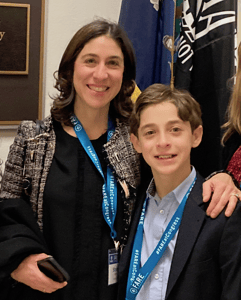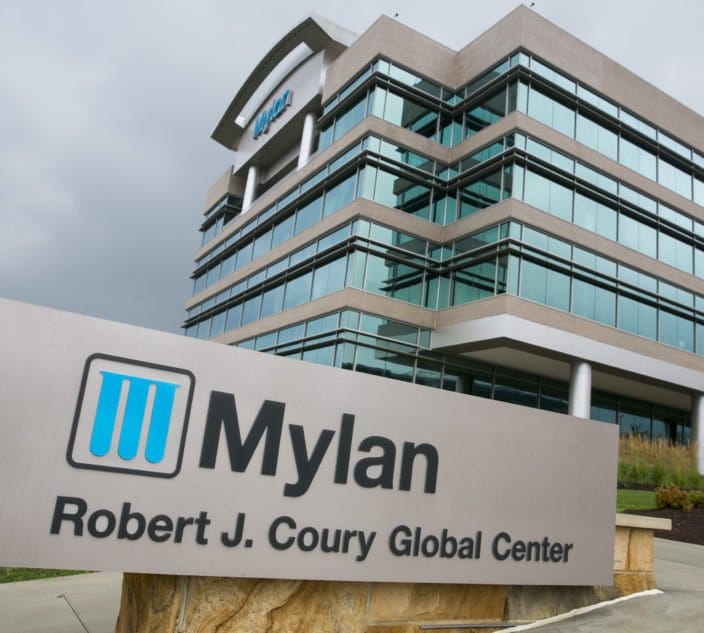
When she first heard the news, Mary Vargas was stunned. Like allergy parents across North America, the disability rights attorney was already finding it challenging to shop for safe foods during the COVID-19 pandemic.
Then the U.S. Food and Drug Administration, or FDA, threw a curveball that has seriously shaken the allergy community: it temporarily relaxed food labeling guidelines. It is a move that has raised alarm particularly among those with allergies beyond the major allergens, known as the Top 8.
In a document released on May 22, the FDA says because of supply chain disruptions, manufacturers can’t always get the ingredients they need to make their products. As a result, it created a temporary policy on food labeling requirements that allows companies to substitute up to 2 percent of ingredients – without changing their product labels.
The FDA does overtly reference allergens. Its temporary policy says manufacturers can make these changes “as long as there are no safety or allergen concerns introduced,” and says they should steer clear of the Top 8 allergens. (The document doesn’t name them, but they are milk, eggs, fish, shellfish, tree nuts, peanuts, wheat and soy.) It also suggests companies avoid foods that are priority allergens in other countries, among them sesame, mustard and lupin.
But critics argue the new guidelines are unclear and don’t take into account that any number of foods can cause severe allergic reactions. If consumers can’t be certain of ingredients in items they’re buying, they or their children could be at risk of anaphylaxis.
“To not be able to look at the label and trust that what it says is actually what is in the food is a basic failure of government to do what it’s supposed to do,” says Vargas. As well as being an attorney, she’s an allergy advocate whose son has multiple food allergies and celiac disease.
Usually a food is considered “misbranded” if it has an incomplete list of ingredients. “In my view, this is a wholesale abandonment of what consumers need in order to be able to participate in the very basic activity of buying food in the supermarket and eating it, and knowing you’ll be safe,” says Vargas. “This is especially so at a time when people are trying to avoid unnecessary emergency room visits.”
Community Speaks Out Against FDA
The FDA’s temporary labeling policy has led to swift backlash in the food allergy community, with parents flooding the FDA’s online comments section with messages.
“My son could die if we don’t know what’s in his food,” wrote the mother of a child with multiple food allergies. “Now I won’t know if companies are using a substitution because you aren’t requiring them to let us know. I’m begging you not to go through with this.”
“This makes it even harder to keep my son safe,” wrote another. “He has life-threatening allergies to more than Top 8. This makes it incredibly difficult to find foods for our family.”
Another parent has an 18-month-old with severe allergies to sunflower, lentils, pea protein and sesame. “It is not acceptable to use a pandemic to cut corners that could cause literally dire consequences. Do better.”
Rachel Pell, the mother of a child with eosinophilic esophagitis (EoE), an allergic inflammatory disease of the esophagus that often requires severely limited diets, launched a petition demanding the FDA reverse course. Within a few days, more than 17,000 people had signed.
NonProfits Negotiate
Leading allergy organizations are also expressing concerns, and negotiating with the government regulator. Last week the Asthma and Allergy Foundation of America (AAFA) along with 11 other groups sent a letter to the FDA. In it, they noted that foods outside the Top 8 can still trigger life-threatening reactions, and asked that the FDA require manufacturers to post any unlabeled ingredient changes on their websites and in their social media.
“By requiring all substitutions to be posted publicly, FDA will ensure that patients navigating less common allergies can identify changes, instead of permitting each manufacturer to determine which changes pose safety concerns,” reads the letter.
When Food Allergy Research and Education (FARE) posted news of the labeling policy on social media, it received hundreds of comments from allergy families. FARE has been encouraging consumers to write the FDA with their concerns.
The nonprofit has also been in talks with the FDA, asking that the agency require companies to inform consumers of any product changes through their websites, social media channels and major online vendors. As well, it wants companies to use labeling alternatives such as stickers to notify buyers that the product formulation has shifted.
FARE CEO Lisa Gable sympathizes with companies working to ensure a steady food supply to 330 million Americans during the pandemic. But she notes that food allergy families already spend endless hours researching brand products, reading labels, and calling companies to ensure their product will be allergy-friendly.
“When you tell them the food they have a great deal of confidence in may have a change to its ingredients, it creates a whole new level of anxiety and concern,” says Gable. “That’s why we’re suggesting that companies immediately go to all their digital platforms and provide the information on what has changed.”
Label Clarity Issues

Allergic Living asked the FDA a series of questions related to allergies and the labeling policy, but only received a press statement in reply. “Because the FDA is responsible for protecting the public health by ensuring the safety of our nation’s food supply, we stress in the guidance that such flexibilities are not to be used when they may pose a health or safety issue,” it reads.
“This means that substitutions, in any amount, are not appropriate without a correspondingly label change, when the substituted ingredient is one that may cause a safety concern (including food allergens).”
However, Vargas argues the temporary FDA guidelines don’t go far enough in protecting people with allergies, because they don’t include clear definitions of terms such as food allergens – and they appear to be guidelines, not hard and fast rules.
“My lawyer brain sees the FDA repeatedly using the word ‘should,’” explains Vargas, who is based in Maryland. “’Should’ is a word that has legal meaning. Should means we recommend, but we don’t require,” she says. “If it says ‘shall,’ it means you have to. It doesn’t say shall.”
Nevada lawyer and disability advocate Homa Woodrum agrees that the ambiguity in the policy is troubling, especially since it doesn’t outline how a company should determine whether a substitution is safe. “The words of the document can say, ‘Please consider safety.’ But it’s a non-binding document,” says Woodrum. “So the FDA has signaled what they are not going to enforce. But there’s no language that enforces the measures an entity would take to determine whether they can take advantage of this relaxed oversight.”
Both Vargas and Woodrum are also concerned that the FDA didn’t go through the usual consultation process, which involves input from experts and the public. (In the temporary policy, the FDA says it “determined that prior public participation for this guidance is not feasible nor appropriate.”)
The food industry has taken notice of the allergy community’s outpouring of concern. Late last week, the Food & Beverage Issue Alliance issued a statement declaring that it would keep consumers “as informed as possible” on any short-term ingredient changes. It promised that “any needed substitution will be communicated to the consumer on a manufacturer’s website or at point-of-sale.”
While that’s a step in the direction the nonprofits seek, it’s a voluntary step, rather than one the FDA requires. And as shown in the comments the FDA is receiving, to many allergy families, this is not likely enough assurance.
Vargas is among those who think the only option is to reverse course. “I think the FDA should immediately retract the policy. If they want to consider a policy change, they should go through notice and comment rulemaking, so everybody’s at the table,” she says. Expert opinion, she says, provides a better way “to know what’s at risk.”
Even if companies post ingredient changes on their websites, says Vargas, consumers who haven’t heard about the new FDA guidance won’t know to look, and will continue to trust ingredient labels.
She is also concerned about places like restaurants, schools and summer camps, which rely entirely on food labels to ensure the safety of customers with allergies.
“All the people who rely on the food system being a certain way, how are they going to know what is safe to eat and serve people if the labels can’t be relied on?” says Vargas.
Food Makers Speak Out Against FDA

Zego Foods founder and CEO Colleen Kavanagh was quick to speak out against the FDA policy change. While her allergy-friendly company won’t be making any substitutions to its food products, she is sympathetic to companies facing supply chain issues.
But like Vargas, Kavanagh is troubled by the lack of clarity in the FDA’s document and the absence of public comment. Now she is calling on her fellow food manufacturers to contact the FDA – not only out of concern for customers with allergies, but also for the food industry itself.
“It’s harmful to companies because it’s decreasing confidence in our food system, and we can’t let that happen,” says Kavanagh. Changing ingredients without updating labels could also open companies to lawsuits, she adds, and create problems when exporting goods to other countries.
“So as companies, we need to tell FDA, ‘You’ve gone too far. You’re actually harming us by doing this.’”
Kavanagh believes manufacturers should be required to post ingredient changes to their websites and vendor websites, and report them to the FDA. She would like to see the food safety regulator keep a searchable and publicly available list to reduce the burden on allergy families.
“Ultimately, if we wanted to be as careful as possible, we would just say, ‘this is not allowed,’” says Kavanagh. Manufacturers having supply chain issues could then go to the FDA to have their concerns heard on a case-by-case basis. “Because anything short of that is going to sow distrust in the food system,” she says.
Dan Waters shares Kavanagh’s concerns. He’s the new CEO of Enjoy Life Foods, the well-known brand that prides itself on producing foods free from the top 14 allergens. Waters is keenly aware that consumer trust is essential.
As a father of a child with a severe peanut allergy, he also has a first-hand understanding of the dangers that unclear labeling can present. “If there’s a swap of one ingredient for another, it might ensure that the manufacturer can continue to supply and sell [the product]. But it has real life implications for people,” says Waters. “So we find it pretty troubling.”
Waters says it’s not uncommon for companies to “over-declare” – that is, they might drop an ingredient from a product, but use the existing packaging until it runs out. However that doesn’t pose a health risk the way adding new ingredients could.
Enjoy Life Foods had no notification that these changes were coming, so Waters suddenly found himself scrambling to reassure customers that his brand isn’t changing anything, even if the government says they can.
“We are free of top allergens, we work in allergen-free facilities, and we do extensive testing. But if consumers start to not trust any brands, that’s a bigger concern,” he says. “They’ll say, ‘What brands can I trust to keep me allergen-free?’”
Trust and Timeline

for the FASTER Act in March 2020.
That is a question that Stacey Saiontz is already asking. Saiontz is the mother of a child with multiple food allergies – including ones outside the Top 8 list – and has spent years lobbying for the FASTER Act, which would see additional protections for people with allergies.
Like allergy parents around the world, she relies on the accuracy of product labels, and once she finds a safe product, she sticks with it. Now she feels like everything has been thrown into question.
“The scary thing is that products I’ve been relying on might not be safe anymore,” says Saiontz. Parents could be in a position where they have to call companies every time they buy something, she adds, and at a time when reaching customer service departments can be a challenge.
“It feels like a step backwards. We should be requiring food companies to be more transparent right now, not less.”
According to the guidelines, the FDA intends to keep the new measures in place until the end of the public health emergency. At that point, it will determine whether an extension is warranted. Saiontz says that lack of a firm timeline adds another layer of complication, because it will be impossible to know whether products on the shelves fall under the new guidance or not – and when that might end.
For her, it just makes sense that manufacturers would give consumers the information they need to buy safe foods. “It seems like such a simple, basic thing. The companies know what they’re putting into their foods. So why not reveal it?” she says. “It makes it safer for everybody and allows people to make informed decisions on what to buy.”
Related Resources
FDA’s temporary policy on food labeling requirements
Comments page for FDA’s temporary policy
12 nonprofits’ letter to the FDA
FARE letter to the FDA
Colleen Kavanaugh’s video to food makers
Homa Woodrum’s Tweet thread on the FDA policy




![My Top Shopping Finds with Food Allergies [Allergy Mom Video]](https://efbcogj6hn3.exactdn.com/wp-content/uploads/2023/03/Allergic.Living.Oral_.Challenge.Video_.00_00_00_00.Still005-704x633.jpg?strip=all&lossy=1&ssl=1)
